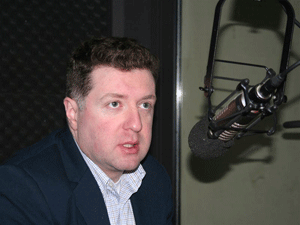Gela Mtivlishvili
 Public Defender of Georgia Giorgi Tughushi criticizes the situation in the orphanages. According to him, based on the interviews with beneficiaries and psychological evaluations of the situation, various methods of violence are used in educational institutions.
Public Defender of Georgia Giorgi Tughushi criticizes the situation in the orphanages. According to him, based on the interviews with beneficiaries and psychological evaluations of the situation, various methods of violence are used in educational institutions.
Special preventive group of the Public Defender’s Office monitored 5 boarding public schools and 16 educational institutions throughout Georgia.
“During the visits of the monitoring groups in the educational institutions, both directors and teachers denied any violent facts against children; however, the real situation demonstrates the opposite,” said the Public Defender.
He said, the most spread forms of violence is verbal insulting, pulling ears up, pulling hair, shouting, threatening, scaring, degrading, for example, making children to stand on one feet in the corner, to stand on the knees, kneeling down and up, forced labor, locking in the room, isolation, leaving without food, restriction of physiological requirements.
“Monitoring exposed several facts of incorrect treatment towards children part of which can be equaled with inhuman and degrading treatment. In several facts, children witnessed inhuman treatment and punishment of their palls,” said Tughushi.
The Public Defender’s report describes the incident which occurred in the Dusheti district boarding school short time ago.
“On February 3, 2010 the personnel of the boarding school called police because one of the teachers lost 100 GEL from her bag. The policemen sat one of the children into the car; they beat and forced him to tell where he had hidden the money. After that, they returned back to the school and started to oppress other children. The teachers also attended this fact. Some of them confirmed the incident in their explanation to the monitoring group of the Public Defender’s Office. One of the teachers said policemen had acted in the same way in other cases too,” it is written in the ombudsman’s report.
As a result of the monitoring, the group discovered some facts of physical and psychological oppression on the children from the teachers and nurses in Kojori boarding school too. The children said their punishment in the institution is an ordinary fact. Some of them had different injuries even during monitoring process.
Children were abused in the Tskneti orphanage too. “When the monitoring group interviewed the beneficiaries, they found out that children are under permanent improper treatment from the personnel as well as from the former beneficiary of the institution certain Vakhtang K. more precisely, the children have been beaten, degraded, physically and psychologically oppressed, locked in the room, left without food, etc,” said the public defender.
There are different sorts of violations discovered. For example, in Kachreti boarding school, the doctor did not hold the corresponding certificate; thus she did not have right to work as a doctor. In addition, she had old medicines in the boarding school.
The public defender paid particular attention to the children’s labor. In accordance to the Convention of the Right of the Child, “States Parties recognize the right of the child to be protected from economic exploitation and from performing any work that is likely to be hazardous or to interfere with the child's education, or to be harmful to the child's health or physical, mental, spiritual, moral or social development.”
The Public Defender’s report states that “child’s labor is used in almost every educational institution. Children do various duties: they clean classrooms and bedrooms, they clean toilets in turn, wash dishes, set tables in the dinning-hall, wipe the floor in the kitchen, clean windows, corridors and staircases, hang up laundry, iron linen and cloths; clean shoes of themselves and others as well, bathe younger children, clean the yard, cut fire-wood and distribute them into the classrooms.”
According to the monitoring group members, the beneficiaries also speak about forced, involuntary labor imposed on them by teachers.
“A child cannot refuse the teacher to do the work despite his/her health conditions. Children often try to avoid the “imposed labor” at the expense of weak and obedient children who do everything without any resistance. One of the elder girls in Kachreti boarding school permanently does various works: “she does washing up in freezing water;” even after illness (pneumonia) she could not resist teachers to do the work. Even during the visit of the monitoring group she was washing in the frozen water and had her hands blue with cold. The interviews and clarifications of the teacher confirm that children really do the abovementioned work; though they justify their behavior by saying: “They learn how to work.”
The ombudsman recommends the Minister of Labor, Healthcare and Social Welfare of Georgia, as well as the head of the Agency for the Disabled, Old People and Children Lacking Parental Care to take urgent measures to eradicate the violations discovered during the monitoring of the orphanages.
Director of the Kachreti boarding school Nino Beroshvili said the accusations against them in the report are groundless. She said the representatives of the ombudsman did not find anything illegal in their institution besides outdated medicines.
According to the chief prosecutor’s of Georgia, preliminary investigation was launched against the policemen of Dusheti district police department for abusing their power in regard with the beneficiaries of the Dusheti orphanage.



